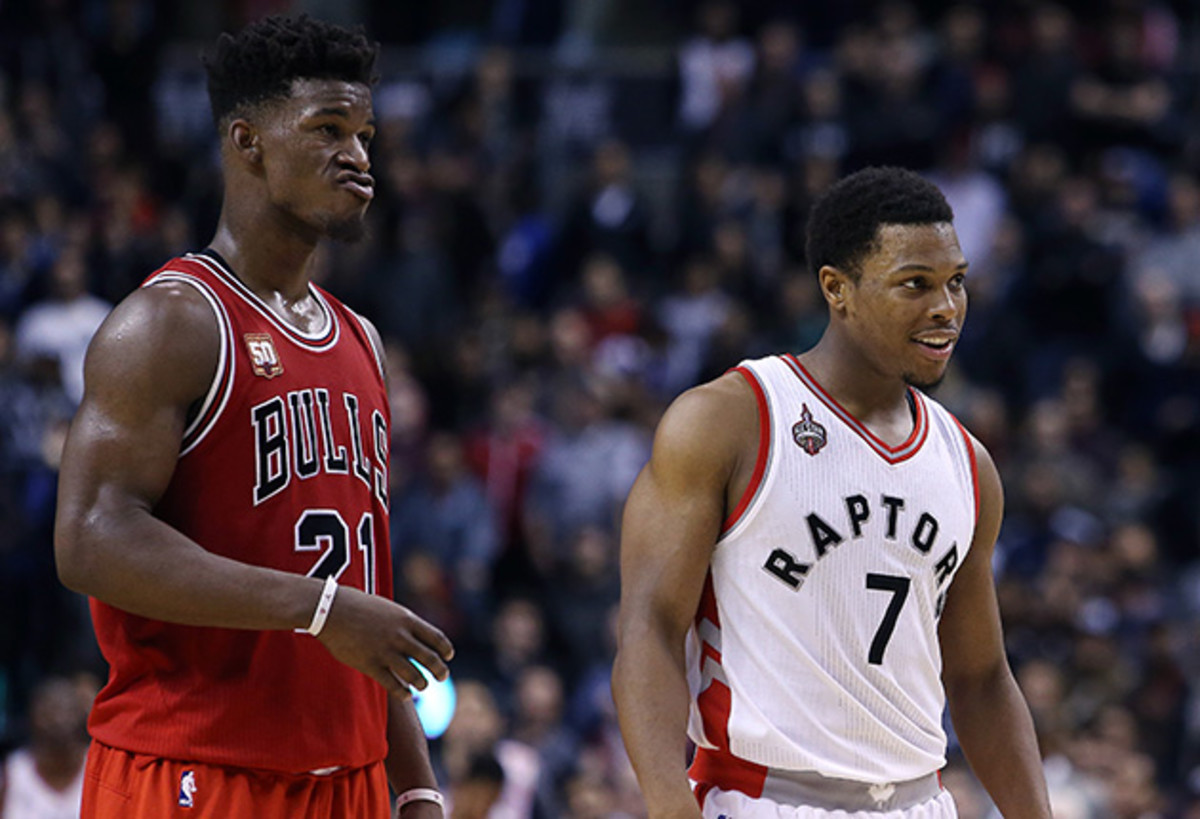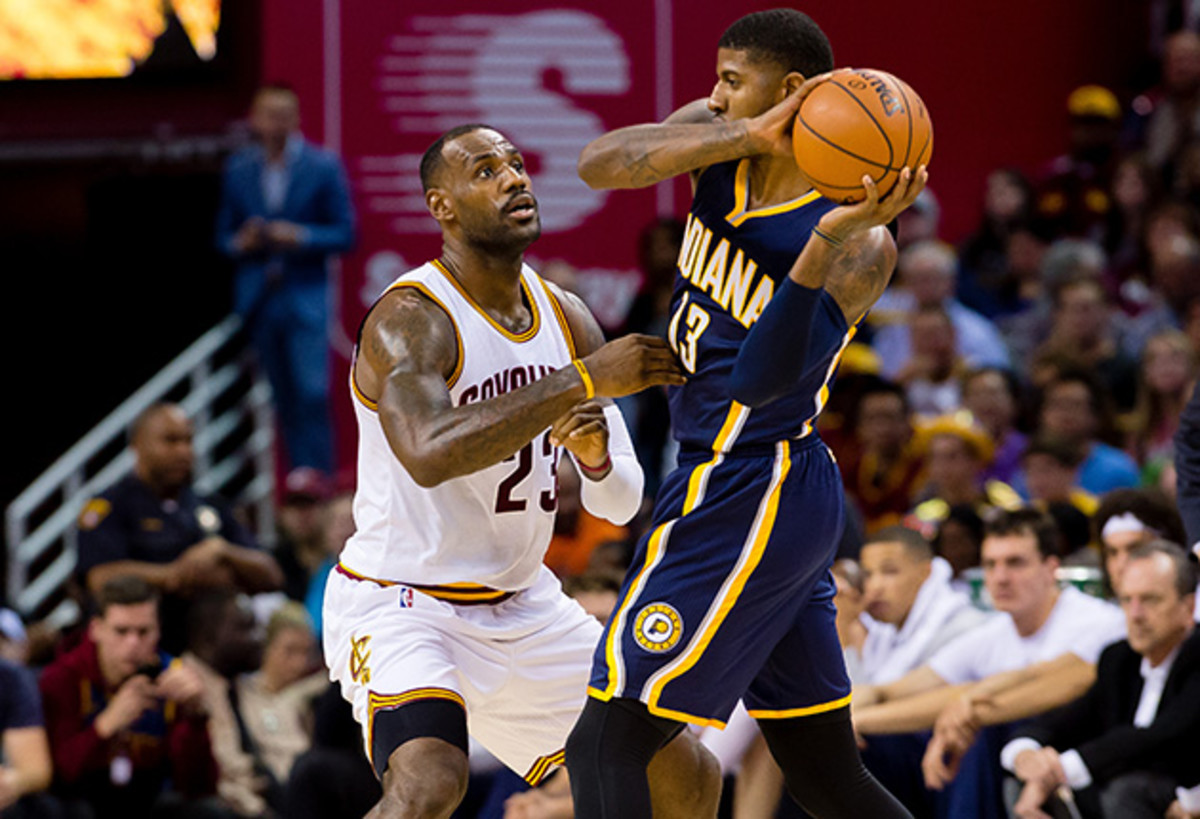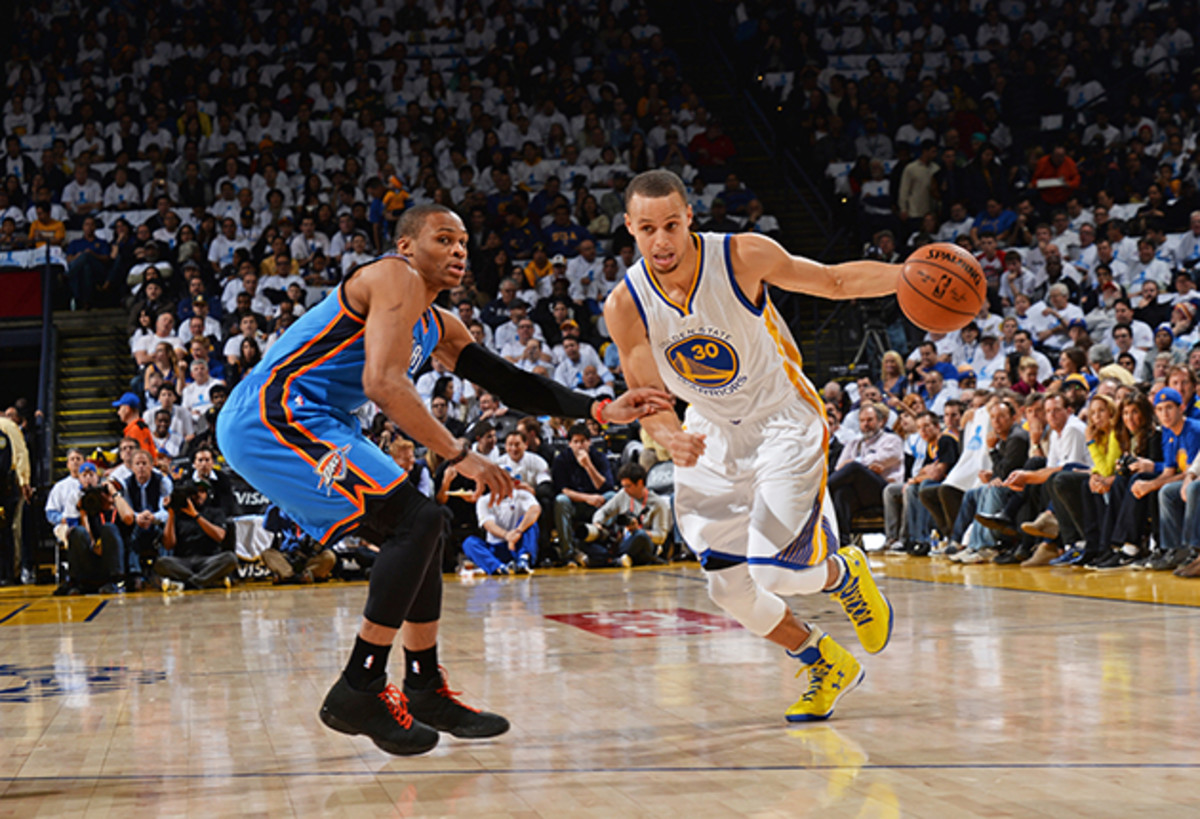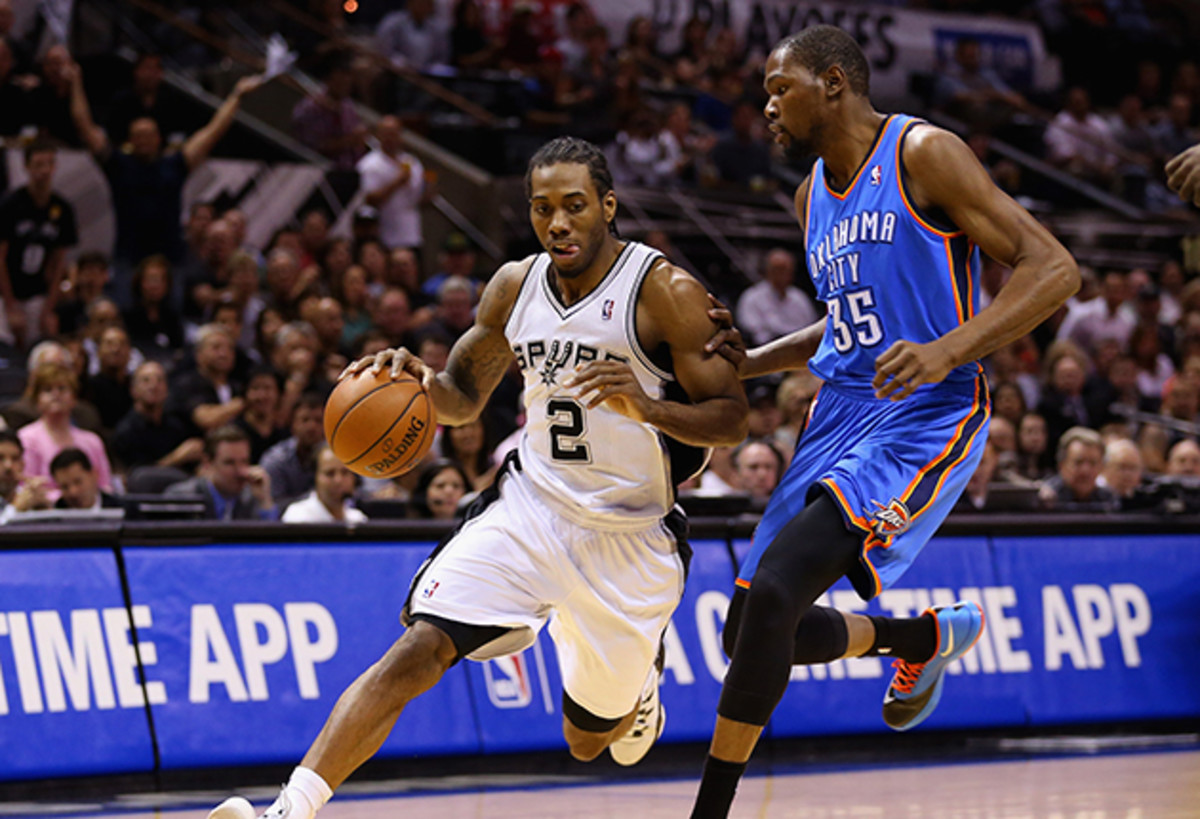SI's 2016 NBA All-Star Game starters

The NBA’s first international All-Star Game is officially right around the corner: fan voting concluded on Monday, the starters were announced Thursday night, and the reserves—always the subject of the most discussion—will be named shortly thereafter.
Below, SI.com reveals its picks for the East and West starting lineups, with our full 12-man roster selections to come next week.
Making these picks involved balancing a number of factors, including: each player’s statistical output and advanced stats performance, impact on his team, and his team’s record. A player’s health, games played, and minutes logged were also taken into consideration. Two “backcourt” and three “frontcourt” players were selected for each conference; players were only eligible for their designation on the official NBA.com ballot. Picks were made based on 2015–16 performance only.
• GOLLIVER: NBA All-Star Game starter snubs, close calls and more
For comparison’s sake, the fan voting produced the following starting lineups:
East: Dwyane Wade (Heat), Kyrie Irving (Cavaliers), LeBron James (Cavaliers), Paul George (Pacers), Carmelo Anthony (Knicks)
West: Stephen Curry (Warriors), Russell Westbrook (Thunder), Kobe Bryant (Lakers), Kevin Durant (Thunder), Draymond Green (Warriors)
Without further ado, here are SI.com’s picks. All stats through Jan. 19.
Eastern Conference
Backcourt: Kyle Lowry (Raptors) and Jimmy Butler (Bulls)

Needless to say, the fan voting process didn’t do its best worst in the East’s backcourt by selecting Irving, who isn’t a legitimate starting candidate because he’s played in only one-third of Cleveland’s games after rehabbing from knee surgery, and Wade, who is a legitimate candidate but just doesn’t quite measure up when it comes to individual efficiency or team success.
Lowry and Butler, who happened to be SI.com’s picks to start last year, are even more clear-cut choices this time around. Both are the driving forces behind two of the East’s top three teams, both are complete and consistent players who have enjoyed good health and logged big minutes, and both grade out at the top of this category in the major advanced stats.
Lowry, point guard for the No. 2 seed Raptors, is averaging a career-high 21 PPG, 6.4 APG and 5.1 RPG while posting a career-best 23.2 Player Efficiency Rating (PER) and a +7.2 Real Plus Minus (RPM), both of which lead the East guard group. That individual production has translated to team success: Toronto boasts the East’s second-best offense despite a host of injuries, and the Raptors’ offensive efficiency is 8.4 points better when the relentless and savvy Lowry is on the court. The East’s other top point guard candidates—John Wall, Reggie Jackson, and Isaiah Thomas—just can’t compete with Lowry’s combination of winning, influence, and total output.
Joakim Noah, the Ultimate Fighter, faces uncertain future with Bulls
As for Butler, the 2015 Most Improved Player has taken his game to new heights this season, averaging a career-high 22.4 PPG, 5 RPG and 4.4 APG while leading the league by averaging 38.2 MPG. Chicago’s physical, gifted shooting guard is in the latter stages of a franchise takeover, as evidenced by his explosive scoring outbursts in Derrick Rose’s absence (53 points against the Sixers and 42 against the Raptors this month) and his more vocal approach in the media. The gap between Butler and Wade is closer than the gap between Lowry and the other point guard candidates, but it’s still big enough to declare Butler an easy pick. After all, he surpasses Wade in PER (21.8 to 21), Win Shares (6.5 to 2.8), and RPM (+4.8 to -0.02); he’s logged 300+ more minutes than Wade, and Chicago remains a cut above Miami in the standings.
Chicago’s superior performance compared to Washington, Detroit, and Boston also helps make Butler a preferable starting option than Wall, Jackson, and Thomas. Toronto’s DeMar DeRozan deserves a mention here, but his second-fiddle status to Lowry makes for an unfavorable apples-to-oranges comparison with Butler.
Frontcourt: LeBron James (Cavaliers), Paul George (Pacers), and Paul Millsap (Hawks)

While the East’s frontcourt section presents the most difficult starting decisions this year, James is a no-brainer selection who needn’t be subjected to the parsing. The four-time MVP is the East’s leading vote-getter and rightfully so: James is averaging 25.3 PPG, 7.3 RPG, and 6 APG while leading the East in both PER (26.6) and RPM (+8.9) and guiding the Cavaliers’ to the East’s best record and top offense. Remarkably, the Cavaliers’ offensive efficiency improves 14.3 points when James takes the court. From every angle, he’s been the East’s top performer.
There are five solid candidates for the other two spots: George, Millsap, Andre Drummond, Chris Bosh, and Carmelo Anthony. Although the fans picked him as a starter in the most recent round of voting, Anthony (21.5 PPG, 7.6 RPG, 3.9 APG) is the first to be dropped in this process of elimination: He’s the only one of the five to play for a team with a losing record and he ranks fifth in PER, Win Shares and RPM.
LeBron James on loss to Warriors: ‘It’s just not the end of the world’
Next up on the chopping block is Drummond, despite his monster numbers (17.6 PPG, a league-leading 15.5 RPG, and a 22.7 PER), Detroit’s pleasantly surprising season, and the Pistons’ amazing viral video campaigns on his behalf. Although he’s made significant strides in terms of his consistency and reliability in Year 4, he’s still not quite as polished as the other three remaining names. His dual headlining role with Jackson also works against him slightly: George, Millsap, and Bosh have all easily been the most important players on their respective teams, and all of those teams have outperformed the Pistons.
So, how to split these hairs? George looks like the most bulletproof of the three thanks to excellent individual numbers (23.9 PPG, 7.4 RPG, and 4 APG), sterling advanced statistics (20.7 PER, 4.6 Win Shares and +4.9 RPM), a central role in Indiana’s offense and defense, and a clear edge in softer categories like star power, narrative and indispensability. Although he’s cooled slightly after a torrid first quarter that had him in the MVP conversation, George has played monster minutes after returning from a leg injury and the Pacers would be absolutely up a creek without him. Could Atlanta make the playoffs without Millsap? Probably. Could the Heat make the playoffs without Bosh? Probably not. Could the Pacers make the playoffs without George? No way in Hell.
The third and final spot on this ballot comes down to Millsap or Bosh, two versatile, polished and experienced forwards who leave a positive mark on both offense and defense. Here’s how close this one is…
• Bosh: 18.8 PPG, 7.9 RPG, 2.5 APG, 21.9 PER, 5.7 Win Shares, +5.3 RPM
• Millsap: 18.4 PPG, 8.7 RPG, 3.5 APG, 23.4 PER, 6 Win Shares, +5.9 RPM
There’s no wrong pick either way, but the nod here goes to Millsap in light of his slight edges in the advanced numbers and Atlanta’s superior placement in the standings relative to Miami. Plus, he was one of SI.com’s starter picks last year and he’s posted better numbers across the board this year.
Given that the fan voting process is expected to “snub” both Bosh and Millsap in favor of Anthony or Drummond, the coaches will need to take care of these guys when it comes time to select the reserves.
Western Conference
Backcourt: Stephen Curry (Warriors) and Russell Westbrook (Thunder)

In recent years, the West backcourt has been Ground Zero for debating over the starters for two reasons. First, Kobe Bryant’s insane popularity has consistency mucked up the fan voting process, regardless of his health or ability. Second, there’s always seemingly four candidates—usually Curry, Westbrook, James Harden, and Chris Paul—with legitimate cases at a starting nod.
This year, however, neither issue really exists: Bryant has been moved to the frontcourt group, thereby easing any backcourt logjam, and the usual four-man Battle Royale has instead been replaced by a two-man blowout.
Curry, of course, is an indisputable first pick. The 2015 MVP and 2016 MVP favorite is averaging a league-leading 30 PPG, 6.4 APG, 5.3 RPG, he’s captaining the league’s most efficient offense, he’s the most important player on the league’s best team, he’s on pace to smash his own records for three-point shooting proficiency, and he’s bent expectations so dramatically that it’s no longer all that surprising when he does something like drain a three-pointer from the outskirts of the center court logo during game action. He ranks No. 1 in the NBA in PER (32.3), No. 1 in Win Shares (9.5), and No. 2 in RPM (+9.7). He is, regardless of conference or positional designation, the single most deserving All-Star.
Warriors, Spurs courting NBA history at opposite ends of basketball floor
Westbrook doesn’t trail Curry by all that much, which says a lot. Oklahoma City’s demanding point guard is averaging 24.2 PPG, 9.6 RPG, and 7.1 RPG, he ranks No. 2 in the NBA in PER (29.3), No. 3 in Win Shares (7.9), and No. 1 in RPM (+10.5), and he’s a driving force for the NBA’s second-most efficient offense and the West’s third-best team.
Paul and Harden have been do-it-all forces, as per usual, but both lag well behind Westbrook in all three major advanced stats. Honestly, the Rockets’ underwhelming performance and shoddy defense disqualify Harden from this discussion, leaving this as a “choice” between Westbrook and Paul. If the Clippers had a better record or a more efficient offense, perhaps a stronger argument for Paul could be mounted. They fail on both counts, though, leaving this to Westbrook, who has logged 200+ more minutes than Paul and been a more dynamic and forceful presence during those minutes. The fans are on track to go 2-for-2 in this category.
Golden State’s Klay Thompson and Portland’s Damian Lillard deserve respectful name-checks here, but nothing more. The sharp-shooting Thompson took a bit to hit his stride and is clearly the third-most important player on his team. Lillard, an offense unto himself, has missed time with a foot injury and posted poor defensive impact numbers for a team that’s well below .500.
Frontcourt: Kawhi Leonard (Spurs), Kevin Durant (Thunder), and Draymond Green (Warriors)

The West frontcourt pool is exceptional and deep again this year, although the category’s top tier of candidates conveniently happens to be comprised of three players. None of those players, of course, is Kobe Bryant, who is riding the good vibrations of his Farewell Tour to the very top of the fan voting process despite posting a 13.1 PER and a -3.3 RPM for the West’s worst team.
Bryant angst aside, the fan voters should be commended for their work in this category: Durant, Green and Leonard are the three most deserving candidates, and they rank No. 2 through No. 4 in the category behind Bryant in terms of votes received. Although no one would suggest that the fan voting process is perfect, it’s hard to argue that it’s totally broken when Green and Leonard, two defense-first talents and advanced stats darlings who have never previously been All-Stars, are outpolling the likes of Blake Griffin and Anthony Davis. That’s exactly how things should be, given Griffin’s extended injury absence and Davis’s lack of progress for the struggling Pelicans, to say nothing of the historic success enjoyed by Golden State and San Antonio.
What can't he do? Draymond Green's skills put him in a category of his own
Once you start gushing about Leonard, it’s hard to stop. The 2015 Defensive Player of the Year is the leading candidate to secure that award again this year, and he’s currently Curry’s top challenger in the MVP discussion. The fifth-year forward is averaging a career-high 20.1 PPG, 7 RPG, 2.6 APG, and 2 SPG while ranking fifth in PER (25.7), second in Win Shares (8.1), and fourth in RPM (+8.7) league-wide. He’s also the leading scorer for the league’s third-best offense, the top talent on (by far) the league’s best defense, a lethal outside shooter, and the most important player for a team that’s on track to set an NBA record for point differential. If the current fan votes hold, Leonard will get snubbed for a starting spot and need the coaches’ help to earn his first career All-Star nod. Thanks, Kobe.
Durant has bounced back from an injury-marred season to become a model of consistency, averaging 26.5 PPG, 7.7 RPG, and 4.4 APG while posting a 28.3 PER (No. 3 league-wide), 7.3 Win Shares (No. 4), and a +6.3 RPM (No. 8). There’s a debate to be had whether Durant or Westbrook has enjoyed the better season, but there’s no question that both of the Thunder’s superstars should be starting in Toronto and both should appear on plenty of 2016 MVP ballots. The fans have smartly backed his candidacy in a big way.
Green is in a fan voting dogfight with Leonard to earn the third and final starting spot. Both are deserving, clearly, but Green’s selection would take on an added significance given that he’s only a tertiary scoring option. In the past, the fans generally reward players who gets buckets; Green does that, but it’s usually through his quick decision-making and excellent passing (7.4 APG) rather than his own scoring (a modest 14.8 PPG). But the Warriors are 38–4 in large part because Green’s impact transcends traditional stats: he ranks 8th in Win Shares and 5th in RPM, lofty placements that are confirmed seemingly every time he steps off the court. Let’s take this one step further: Green should not only be a starter in Toronto, but his defensive versatility and offensive playmaking should earn him a spot on USA Basketball’s Olympic team in Rio this summer, even though he hasn’t previously represented his country.
As mentioned, Leonard, Durant, and Green are slam dunk selections and there’s a nice symbolism to each of the West’s top three teams getting a starting nod with that trio. Honorable mention in this category goes to San Antonio’s LaMarcus Aldridge, Griffin, and Davis.
